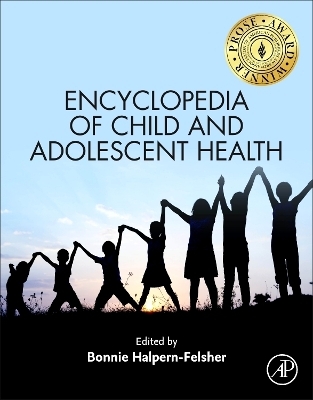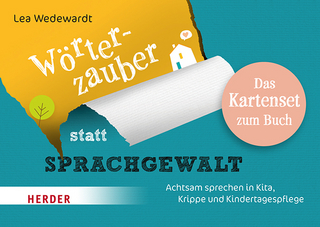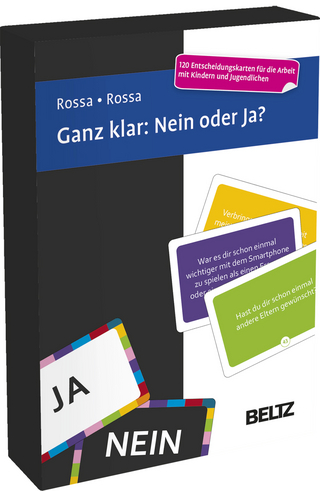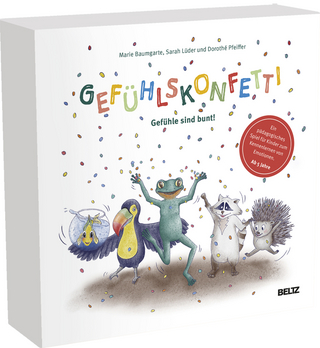
Encyclopedia of Child and Adolescent Health
Academic Press Inc
978-0-12-818872-9 (ISBN)
In addition to the Biopsychosocial Model, this Encyclopedia of Child and Adolescent Health has a translational approach. Each section and all applicable entries include a discussion of prevention or intervention efforts that can inform health and health promotion, and prevent health risks.
Bonnie Halpern-Felsher, PhD, FSAHM, is the Marron and Mary Elizabeth Kendrick Professor in Pediatrics II and the Taube Endowed Research Faculty Scholar. Her primary appointment is in the Division of Adolescent Medicine, Department of Pediatrics. She holds courtesy appointments in the Departments of Epidemiology and Population Health and Psychiatry and Behavioral Sciences. She is the Director of the Stanford Reach Lab. Dr. Halpern-Felsher is a developmental psychologist with additional training in adolescent and young adult health. Funded by the NIH and many foundations, her research focuses on cognitive, psychosocial, and environmental factors involved in adolescent and young adult health-related decision-making, health communication, and prevention. She particularly focuses on understanding and reducing adolescent and young adult tobacco, alcohol and marijuana use, risky sexual behavior, driving, and other health-related behaviors. She then translates her research into prevention and cessation efforts and into informing policy. Her research as well as her committee and policy work have been instrumental in setting policy at the local, state, and national level. She has served as a consultant to a number of community-based adolescent health promotion programs and has been an active member on several national campaigns to understand and reduce adolescent tobacco/e-cigarette use and other risky behaviors. She has testified in several states, at the US Food and Drug Administration, and in the US Congress arguing for more tobacco/e-cigarette regulation, served on six Institute of Medicine/National Academies of Medicine committees, and contributed to three Surgeon General Reports, all focused on reducing adolescent risk behavior and promoting health. Dr. Halpern-Felsher also translates her research findings into adolescent prevention programs, such as three programs in which she is the founder and executive director: Tobacco Prevention Toolkit, the Cannabis Awareness and Prevention Toolkit, and the Vaping Information, Solutions, and Interventions Toolkit. In addition to her scholarly work, Dr. Halpern-Felsher developed and leads several programs and courses aimed at teaching research to undergraduate, graduate and medcial students and fellows, and she developed and directs several mentoring programs for underrepresented youth. In recognition of her research, advocacy and mentoring roles, Dr. Halpern-Felsher has received several awards, including the Department of Pediatrics’ Advocacy Award in 2019, the Postdoc Mentoring Award in 2019, and the Clinical Science Research Award in 2021.
Section 1: Brain Development edited by Dr. Ali Khaledi-Nasab
Section 2: Child Physical Health edited by Dr. Brian Eichner, MD and Dr. Emily McCormick
Section 3: Adolescent Physical Health by Neville H. Golden MD
Section 4: Cognitive and Psychosocial Development by Dr. Anna Epperson
Section 5: Child and Adolescent Risk Behaviors by Dr. Anna Song and Dr. Patricia Cabral
Section 6: Family Influences on Child and Adolescent Health by Dr. Rosalie Corona
Section 7: Peer Relationships across Child and Adolescent Development by Mitch Prinstein, Ph.D
Section 8: Medial and Social Media Influences on Child and Adolescent Health by David S. Bickham, Ph.D
Section 9: Strength-based Approaches to Community Health by Dr. Oswaldo Moreno
| Erscheint lt. Verlag | 17.2.2023 |
|---|---|
| Mitarbeit |
Chef-Herausgeber: Bonnie Halpern-Felsher |
| Zusatzinfo | 200 illustrations (100 in full color); Illustrations |
| Verlagsort | San Diego |
| Sprache | englisch |
| Maße | 216 x 276 mm |
| Gewicht | 450 g |
| Themenwelt | Geisteswissenschaften ► Psychologie ► Entwicklungspsychologie |
| Geisteswissenschaften ► Psychologie ► Pädagogische Psychologie | |
| Medizin / Pharmazie ► Medizinische Fachgebiete ► Psychiatrie / Psychotherapie | |
| ISBN-10 | 0-12-818872-3 / 0128188723 |
| ISBN-13 | 978-0-12-818872-9 / 9780128188729 |
| Zustand | Neuware |
| Informationen gemäß Produktsicherheitsverordnung (GPSR) | |
| Haben Sie eine Frage zum Produkt? |
aus dem Bereich


